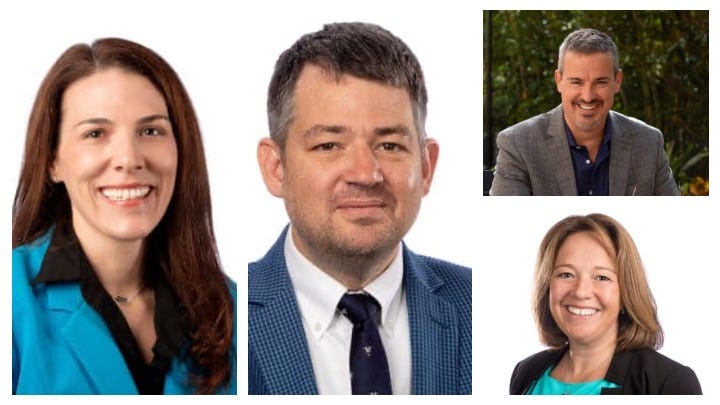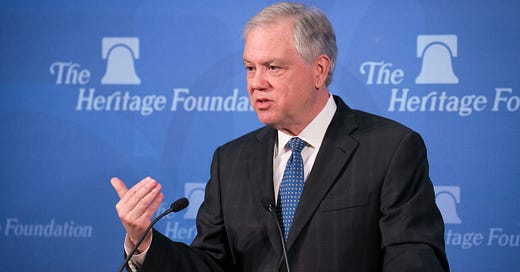When we released the Freedom Conservatism Statement of Principles last month, it argued that applying the timeless insights of the Founders to today’s problems would help “ensure that America’s best days are ahead.” In preparing the document, we drew from our country’s deep reservoir of political wisdom, including “the pursuit of happiness,” the “promissory note,” and the “shining city on a hill.”
Today we feature the work of FreeCon signatories and allies who encourage American conservatives to offer a bold, principled, and constructive alternative to the progressive Left and the illiberal Right.
Illiberal means for conservative ends?
Kim Holmes is a former State Department official who spent decades in policy and leadership roles at the Heritage Foundation, retiring as executive vice president in 2021. The author of such works at Liberty’s Best Hope: American Leadership for the 21st Century (2008), Rebound: Getting America Back to Great (2013), and Closing of the Liberal Mind: How Groupthink and Intolerance Define the Left (2016), Holmes now serves as vice chairman of the Center for International Private Enterprise.
He is also a signatory of the FreeCon statement. In a recent Dispatch essay, Holmes predicted that attempts by National Conservatives and other “post-liberals” to use big-government means for conservative ends will lead to disaster.
It isn’t just that their policy mix of tariffs, regulations, central planning, and accommodation to authoritarianism at home and abroad will produce bad outcomes for Americans, though they certainly will. Another danger is that their feckless policies and reckless rhetoric will strengthen the political power of the Left.
The post-liberal Right “is committing a huge error in thinking that anger and hubris can build a broad movement,” Holmes wrote. “It may be the way to get nominated in presidential primaries—and it sure is good social media copy—but it is not a winning formula for the long run.”
One reason NatCons get America’s present and future wrong is that their understanding of the past is inaccurate and incoherent. They blame any conservative defeats on an inflexible devotion to so-called market fundamentalism when in reality such defeats were the result of our leaders failing to apply limited-government insights consistently and creatively.
Holmes offered this chilling prediction:
If [the illiberal right] continues to reject conservative principles on governance, the economy, and foreign policy, it will destroy American conservatism for good. As frustrated nationalists’ resort to more centralized power to punish their enemies, they will find that their illiberalism cannot match the reach and power of the illiberalism of the left.
Devolve power to foster hope and opportunity

The State Policy Network has spent decades cultivating pro-freedom movements across the country. Among our FreeCon signatories are dozens of leaders of state-based organizations as well as SPN executives Tony Woodlief, Carrie Conko, and Ray Nothstine, who edits the organization’s new online journal of federalism, American Habits.
For a recent article in the journal, SPN strategist Erin Norman delved into survey data on American optimism. While deeply distrustful of the federal government — for good reason — most Americans continue to say they’re hopeful about their personal futures (65%) as well as the future of the states in which they reside (60%).
Americans have traditionally been more optimistic than the residents of other countries. One reason, Norman argued, is that for most of American history, government power was decentralized:
Americans have a long history of optimism that stems from their unique ability to govern themselves in their communities. Where that power is diminished, pessimism about the future seeps in. States, and the localities within them, must stand up to the federal government and reclaim their ability to self-govern if American optimism, and the benefits it produces, are to endure.
In the FreeCon statement of principles, we observed that “much of the discord in America today comes from the fact that too many decisions are made for us by centralized authorities.” FreeCons pledge to “transfer as many public policy choices as possible to families and communities.”
‘Owning the libs’ isn’t enough
A former litigator, chapter president of the Federalist Society, and state director of Americans for Prosperity, signatory Russ Latino is now the CEO of the Magnolia Tribune, a media outlet he founded to cover the politics, business and culture of Mississippi.
In a recent Tribune column, Latino criticized some self-styled American conservatives for losing sight of the movement’s core values:
In attitude, too often today “conservative” is defined by who is the loudest and most brazen, or by what conservatives are not, as in “at least we’re not those guys.” But loud, angry, and obnoxious does not a conservative make. Neither does a self-identity tied up in “owning the libs.”
Fundamentally, conservatives believe, and thousands of years of human history establish, the greatest catalyst for human thriving is individual freedom. The greatest threat to freedom is the top-down concentration of power. Indeed, almost every large scale atrocity in human history is a byproduct of the gathering of political power to subjugate people—most often vulnerable minorities.
FreeCons seek to “reanimate” the principles of conservatism, Latino concluded, which distinguishes us from politicians and activists in both major parties who “seem more consumed with gathering power to impose their will on the other” than with “limiting the power that would allow for this imposition in the first place.”
More ways to follow us
We manage social-media accounts to keep readers apprised of new articles, insights, and interviews by Freedom Conservatives and their allies. As plans come together for future FreeCon projects and events, we’ll share the details on these feeds, as well. You can follow us on Twitter/X, LinkedIn, and Facebook.




